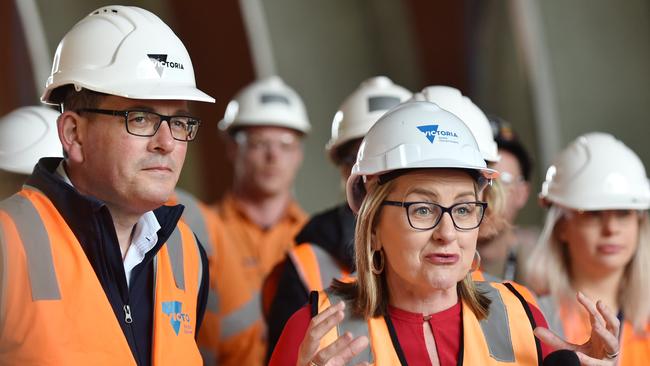Victoria ranks last for business amid state spending splurge
The state’s dismal budget performance and anti-competitive policies have put Australia’s second biggest jurisdiction behind the pack, according to a new report.

Victoria is the worst place in the country to do business, with the state’s dismal budget performance and anti-competitive policies led by Daniel Andrews and Jacinta Allan putting Australia’s second biggest jurisdiction behind the pack.
A report by the Business Council of Australia on Tuesday shows Victoria ranks last across all states and territories in terms of overall settings for doing business in the country.
After 10 years of Labor rule in Victoria, the Allan government now boasts the highest debt and worst credit rating across all Australian states.
BCA chief executive Bran Black, who is pushing Jim Chalmers to accelerate and expand the Albanese government’s productivity fund supporting states and territories, said Victoria must “address its regulatory environment, which is putting a handbrake on the economy”.
“Victoria has some of the least competitive property tax settings, payroll taxes and business licensing requirements in the country — it fundamentally needs to look at how these are holding back its economy,” Mr Black said.
The BCA Regulation Rumble report, examining red tape, planning systems, payroll taxes, retail trading hours, property taxes and changes, business licences and workers compensation premiums, found Peter Malinauskas’s South Australia was the best state to do business.
As the country grapples with low productivity, high interest rates and soaring costs, Mr Black said “fundamentally, greater business investment results in improved living standards – that’s the goal”.

Ahead of the release of national accounts figures on Wednesday, which are expected to confirm flatlining economic growth through the September quarter, Mr Black said governments must be more competitive in wooing business investment. “Cumbersome regulation and taxes prevent a business from investing or expanding its operations and that impacts on economic growth and jobs,” he said.
SA, which boasts Australia’s most efficient planning system, led Tasmania, the ACT, Northern Territory, NSW, Queensland, WA and Victoria in overall rankings for the best state or territory to do business.
Mr Black said SA, which has streamlined business licensing rules and adopted lower payroll taxes and property charges, had “made it clear that they want their state to be destination No. 1 for business, and other jurisdictions need to take note if they want to remain competitive”.
A separate Institute of Public Affairs report released on Tuesday warns that territory, state and federal governments are “spending at levels not seen since the Covid pandemic, which is keeping interest rates high and fuelling the cost-of-living crisis”.
The IPA report claims that government spending at all levels is $129bn a year above the decade average and since the 2022 election, 55 per cent of total economic growth has been attributable to increased government spending at federal, state and territory levels.
IPA senior fellow Kevin You said “there is an unprecedented over-reliance on the taxpayer and on debt, government spending is now the largest share of the economy and the biggest contributor to economic growth”.
“Despite all this debt-fuelled spending, since the election of the Albanese government, Australians are living with the consequences of six straight negative quarters of per capita GDP growth, and the contribution of private sector investment and net exports to overall economic growth has collapsed to just 6 per cent,” Dr You said.
“There have been more quarters of negative GDP per capita growth under the current federal government than any other federal government since digitised records began in 1970. Real GDP per capita has declined in seven of nine quarters of this term of government so far.”
Dr You said it was critical federal and state governments cut spending and red tape and put policies in place to deliver “sustainable economic growth based on increased productivity … We cannot spend our way to long-term, sustained economic prosperity. Unprecedented debt levels will have to be serviced and paid off by future generations and it weakens the nation’s ability to deliver infrastructure and basic services the community expects.”






To join the conversation, please log in. Don't have an account? Register
Join the conversation, you are commenting as Logout